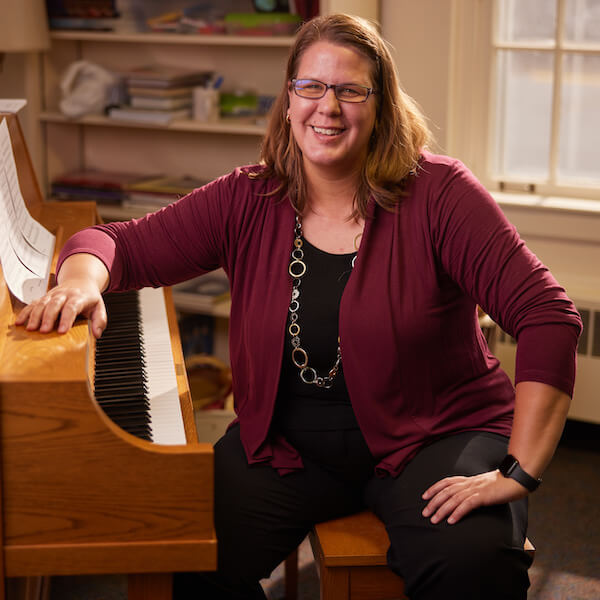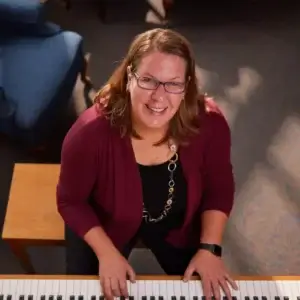
Get to know Elizabeth Stegemoller
ASSOCIATE PROFESSOR, KINESIOLOGY
In 2000, as a soon-to-be graduate of the University of Missouri with a bachelor’s degree in biology, Elizabeth Stegemoller realized something unfortunate: she hated studying biology. This startling realization occurred with just one year of her undergraduate education left before going down the path of becoming a doctor of sports medicine. Enter her college best friend — a member of the university’s conservatory — who suggested that she channel her lifelong love for playing the piano into pursuing a career in music therapy.
“That was my light bulb moment,” Elizabeth says. “I ended up doing a double major in music therapy and biology. But what really established my career trajectory was when I had to take a neuroscience elective during clinical practicums for music therapy. That’s when everything really came into place. I fell in love with neuroscience and knew I wanted to pursue it, and music, somehow, which led to me ultimately getting my Ph.D. in the field.”
As an associate professor of Kinesiology in the Iowa State University College of Human Sciences and a board-certified music therapist, Elizabeth is still channeling her love for music into everything she does. Her research focuses on the effects of singing on people battling Parkinson’s disease, with special attention paid to the impact of music and singing on quality of life, Parkinson’s disease symptoms, and the brain itself. In addition to using multiple high-dollar awards — including a recent a three-year grant from the National Endowment for the Arts — to evaluate singing as a tool for addressing impairments to speaking, swallowing and breathing caused by Parkinson’s, Elizabeth also runs a singing outreach group for persons with the disease”

“Currently, people with Parkinson’s disease will take medication, or they’ll have some sort of deep brain surgery. But that doesn’t cure all symptoms and it doesn’t always affect quality of life,” Elizabeth says. “Singing has a pervasive effect on many motor symptoms, including tremor, gait, and most importantly, swallow in terms of symptom improvement. Some participants in my singing group see an improvement in their motor symptoms that are three times that of what the medication would be.” For Elizabeth, her research is a holistic approach to helping people in the here and now, something she believes often gets lost in translation during the scientific process. For her, the new frontier of medical research has less to do with chasing a cure for parkinson’s disease than it does with developing a fuller understanding of what happens inside the brain as the disease progresses, and the promise singing holds to counter it.
“In our society, we are so heavily driven on drugs, pharmaceuticals, and finding a cure for everything,” Elizabeth says. “But we have 2 million people in the U.S. living with Parkinson’s disease right now, and researchers often forget about this. Who knows if there will ever be a cure. But if there is a way to slow it down, make patients’ quality of life better, and they can do that by just singing? That is a pretty big impact on its own.”
Since joining the Iowa State research community in 2013, Elizabeth’s proudest professional accomplishment remains the opportunity she has had to make a real difference in the lives of Parkinson’s patients, their caregivers, the students she mentors, and the community that has emerged through her research. “If I can do a little something to change just one person’s life, impact their life in a positive way, that’s going to carry on,” Elizabeth says. “It’s my favorite part, just to be able to help people and be a witness to the support that’s taking place.”
